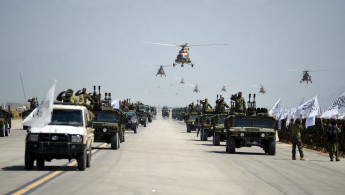UN rights expert says ban from Afghanistan a backwards step
The United Nations' special rapporteur on human rights in Afghanistan said Wednesday the Taliban's ban on him entering the country sent a troubling signal about their engagement with the wider world.
Richard Bennett called the ban a retrograde step that should be reversed but vowed he would continue to document human rights violations in Afghanistan.
"The Taliban's public announcement that they will no longer grant me access to Afghanistan is a step backwards and sends a concerning signal about their engagement with the United Nations and the international community on human rights," he said in a statement.
Since returning to power in August 2021, Taliban authorities have enforced their rule based on a strict interpretation of Islamic law.
Women have borne the brunt of restrictions the UN has labelled "gender apartheid", which have pushed them from public life.
They have been barred from secondary and higher education, as well as from working in many jobs, entering public parks and gyms, and travelling without a male relative.
The Taliban government remains unrecognised by any other state, with its restrictions on women a key sticking point.
In recent months, Bennett has issued strong statements on women's rights in Afghanistan, a country that is in the international spotlight.
Taliban authorities have dismissed criticism of their policies.
"Despite this announcement... I will continue to engage with the people of Afghanistan, both inside and outside the country, as well as other relevant stakeholders," said Bennett, adding he had not travelled to the country in over a year.
"I will also continue to document human rights violations and abuses and advocate for improvements."
Distrust
UN special rapporteurs are independent experts appointed by the UN Human Rights Council in Geneva. They, therefore, do not speak for the United Nations.
Bennett marked two years in the role on 1 May.
"I have consistently sought to engage transparently with the de facto authorities," he said, including providing them with critical assessments and practical recommendations on the human rights situation.
"I urge the Taliban to reverse their decision and reiterate my willingness and availability to travel to Afghanistan."
When the ban was apparently issued months ago, the Taliban government stressed that their issue was not with human rights monitoring and reporting, but with Bennett personally, according to diplomatic sources.
On Tuesday, Afghanistan's Tolo News quoted chief Taliban government spokesman Zabihullah Mujahid as saying that Bennett had been banned "because he was appointed to Afghanistan to spread propaganda and he is not someone whose words we can trust".
Last week, as the Taliban authorities celebrated the third anniversary of their takeover of Afghanistan, Bennett joined 29 other UN experts in a statement urging the international community to "not normalise the de facto authorities or their appalling human rights violations", he said on X.
UN chief Antonio Guterres' spokesman told reporters in New York that in several cases, special rapporteurs did not have access to the areas they were covering, though this did not stop them from finding ways to report.





 Follow the Middle East's top stories in English at The New Arab on Google News
Follow the Middle East's top stories in English at The New Arab on Google News


![A group of Palestinians, foreign and Israeli activists gather to participated in an olive picking event on the land in the town of Battir, which is under threat of confiscation by Israel in Bethlehem, occupied West Bank on 8 November 2024. [Getty]](/sites/default/files/styles/image_330x185/public/2182930803.jpeg?h=199d8c1f&itok=__0LgGsa)